By: Carsyn Cann
FAYETTEVILLE, Ark (UATV) – The Trail of Tears, a series of forced displacements of approximately 60,000 Native Americans by the United States government in the 1800’s, led Indigenous people to Arkansas. Not only did The Trail of Tears come through Arkansas, but it came through the University of Arkansas campus.
A statement by the Fulbright College of Arts and Sciences acknowledged that the land the university sits on, was once home to Native Americans- “The Indigenous history of the land the University of Arkansas campus sits on goes back to time immemorial, and across that expanse of time, many successive groups have lived here and created sacred legacies in this area. We further recognize that a portion of the Trail of Tears runs through our campus, and that the Cherokee, Choctaw, Muscogee (Creek), Chickasaw and Seminole Nations passed through what is now Arkansas during this forced removal.”
While many tribes just came through Arkansas on their way to Oklahoma, a few made a home here. The Osage, Caddo, Quapaw and, later, Cherokee tribes all lived on land in this area.
The Indigenous Studies Program at the University of Arkansas was founded in 2013. Sean Teuton, Director of Indigenous Studies at the U of A, said that it was beyond time to bring this program to the university. “I think scholars, students and community members looked around and said ‘with all the Native American history and presence here, why aren’t we making these a part of our university curriculum and recruiting Indigenous students and faculty?,’” said Teuton.
The Indigenous Studies Program continues to develop their teaching through Native American guest speakers. During this semester, the Multicultural Center hosts a Cherokee language and culture series titled “Words and Ways.”
The first guest speaker in the series was Cherokee National Treasurer David Comingdeer. On October 20th, Comingdeer spoke with students about the traditional game of “stick ball.” This game is traditionally played between tribes to settle disagreements and wars.
Comingdeer said this global leaders today could take a lesson from their game. “Wouldn’t it be amazing today if these countries were mad enough, instead of pushing buttons and blowing people up, that they could say ‘put your best man out here, we’ll play ball.’ That would be amazing- that’s the way the Indian nations did it,” said Comingdeer.
Another way the Indigenous Studies Program attempts to grow their program is by bringing in Native American professors. A citizen of the Cherokee Nation, Lawrence Panther, is in his first year teaching the endangered language of Cherokee here at the U of A. Currently, only 22,000 people can fluently speak Cherokee, one of those being Professor Panther.
Panther is originally from Kenwood, OK. Panther said that growing up, his family stayed secluded from the outside world because no one in his family spoke English. “I didn’t learn how to speak English till I was six years old,” said Panther. “All my family- brothers, sisters, everybody- spoke Cherokee; there was no English speaking at all. For a long time I thought it was just us, Cherokees, living on a hill.”
The history of Native Americans is embedded in the Northwest Arkansas area. Panther says to learn more about their culture, people have to spend time with the those that make up Indigenous communities. “As an outsider coming in, you usually don’t know what it’s like, so you just have to be around them (Native Americans), but they’re acceptable,” said Panther.
The “Words and Ways” series continues on October 20th featuring Professor Panther as the guest speaker. Panther will speak on matters such as the importance of maintaining Indigenous languages and will share stories of his life.
As Indigenous People’s Day approaches on October 11th, Comingdeer reminded attendees to remember Native American history and how it has affected all of American history. “The pilgrims and the first Thanksgiving, that hospitality came from us (Native Americans). We contribute a lot to the world. Democracy, everyone having a voice, that’s Indians,” said Comingdeer.
To honor Indigenous People’s Day and Native American traditions, the city of Bentonville hosts a free celebration of culture event- “Indigenuity: Building a Bridge to the Future.”- at the Native American History Museum this weekend.
The event will bring together American Indian scholars, NASA astronauts, craftsmen, authors, artists and musicians for three days of workshops, presentations and concerts. The event is free to anyone wishing to attend.


